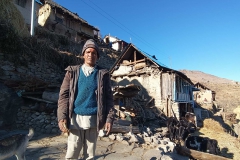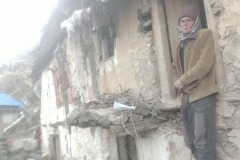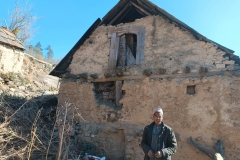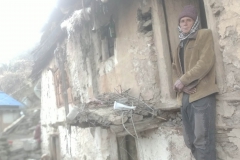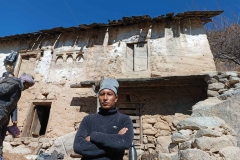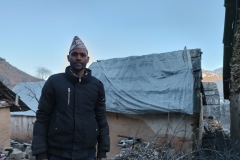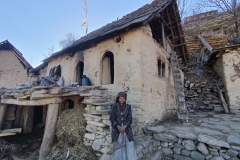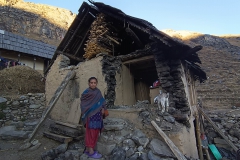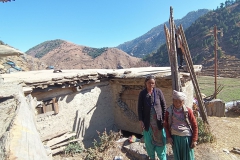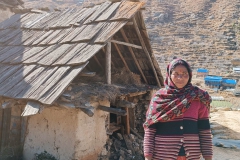Disaster Risk Reduction and Humanitarian Assistance
Initiation of DRR and Humanitarian Assistance in DEPROSC-Nepal
Disaster Risk Reduction and Humanitarian Assistance has been one of the major themes of DEPROSC-Nepal since long. At the beginning, DEPROSC-Nepal executed humanitarian assistance without recognizing that this would be an area of its major engagement today. In 2000, DEPROSC-Nepal had been involved in Humanitarian assistance through simply supporting microfinance clients at that time. It was moreover informal as well. Clients used to share their gains and pains, asking for support for their household matters. In that way, DEPROSC-Nepal got some sort of binding with the clients beyond the formal microfinance programme and has generated a sense of accountability which led to a response in a fire caught in one of settlements of microfinance clients 22 years ago. We responded with some dry food, rice, lentils, utensils, and hygiene materials to them and that was a spontaneous humanitarian response.
Later from 2003, DEPROSC-Nepal with financial support from the United Nations World Food Programme launched the Quick Impact Programme (QIP) in the then mid-west and far-west regions of Nepal as a humanitarian response during the insurgency. And we gradually responded to a number of disasters and humanitarian responses such as drought, fire, landslide, global food price hike, health epidemics, floods, earthquakes and recently COVID-19 pandemic in different geographic areas.
By now, DEPROSC-Nepal is significantly involved in the field of Disaster Risk Reduction and Management front as well. Preparation of contingency plans of district development committee (Ramechhap), many local NGOs (mainly local partners of Oxfam), capacity building support to various human resources of this field and advocacy for promulgation of Disaster Management Act are some of the areas to name.
After the Grand Bargain in 2016, DEPROSC-Nepal is actively engaged in educating people about the outcomes of the Grand Bargain, capacity building of local NGOs, conducting research advocacy for localization. DEPROSC-Nepal successfully completed the responsibility of being a Steering Committee Member of ALtP[1] that initiated in four southern countries to promote and expedite the outcome of Global Humanitarian Submit 2016 and finally has contributed to furnish a localization framework to the government of Nepal, however GON is yet to endorse it.
Even prior to that, DEPROSC-Nepal performed as a member in different clusters, which were formed for preparation and response at the time of disaster. DEPROSC-Nepal was an active member of the Food cluster, WASH cluster and Logistic cluster. In addition, DEPROSC-Nepal was a strategic partner of OXFAM for the livelihood support upto 2015. At some period of time, it was also a standby strategic partner of UNWFP and UNDP for disaster response.
At present DEPROSC-Nepal is a member organization of NEAR Network[2] which aims to advocate for the localization of humanitarian response. Likewise, DEPROSC-Nepal is also an active member of Local Humanitarian Leadership (LHL)[3] forum initiated by Oxfam International that is loosely formed and exists for the cause of improved humanitarian aid system and promote Local Humanitarian Leadership (LHL) in the global south. DEPROSC-Nepal also shared local organizations perspective on humanitarian reposes in the COVID-19 context on behalf of local organizations in a global webinar organized by Center for Humanitarian Leadership, Deakin University[4][4], Australia.
DEPROSC-Nepal is deeply involved in the humanitarian response but at the same time advocates for structural changes for the humanitarian aid system in the global south.
Objective
Overall objective of this concept note is to better prepare DEPROSC-Nepal to get involved in Disaster Risk Reduction and Humanitarian Assistance in the long term. But in particular, this concept note is an attempt to express the true inner feelings of DEPROSC’s-Family members to help vulnerable families in pain obtaining funds from Nepalese diaspora.
Management and Coordination
DEPROSC-Nepal will call for the support primarily of its goodwill ambassadors who will form a loose Management Committee (MC) to start the work. Similarly, a loose Alumni will also be developed which will represent into the loose management committee. Gradually, the Alumni will increase its members including all DEPROSC-Nepal Alumni globally, and try to invite various individual donors around the world.
DEPROSC-Nepal will form a key management team led by a director level staff which will be activated based on the occurrence of the events and the casualty in the Palikas/district. DEPROSC-Nepal will mobilize its gender sensitive trained human resources as needed. List of possible volunteers will be prepared during the preparation phase.
The committee and the team in DEPROSC-Nepal will periodically review and revisit the concept (half yearly for now) to make necessary amendments based on response results.
End Use of Funds
This is a crowdfunding initiation. Basically, funds will be generated from outside the country through the execution of donation collection campaigns utilizing some globally popular tools like Gofund. Besides, DEPROSC alumni, and regular staff, executive committee members, general members will also contribute inside the country which will work as a foundation stone to start the anticipatory and response activities.
There will be two windows to get funds into the accounts of DEPROSC-Nepal. For this, DEPROSC-Nepal has signed MoU with PlayToHelp. PlaytoHelp is a IRS registered and approved public charitable organization based in California started by a Nepali, (https://playtohlp.org/). For outside country, fund will be raised through online platforms like GoFundMe. PlayToHelp will help in collecting funds outside Nepal and transfer to DEPROSC-Nepal account. For within country, DEPROSC-Nepal will collect funds through its official website where it has developed donation collection system with inbuilt payment gateways in it.
DEPROSC-Nepal will maintain full transparency of the funds received from both the windows (international and national). A separate bank account will be maintained, cases supported will be posted in the website, periodic audit of the funds and programme will be done. Upon request and interest, individual donors can take part in the process of response and witness it, however should follow the code of conduct.
DEPROSC-Nepal utilizes the funds received from such individual donors for making support only. No funds will be used for salary and benefits. But it will be mobilized to meet staff movement and program delivery costs, such as: travel, transportation, carrying goods, paying rent to the warehouse and mobilizing local laborers.
Response description
DEPROSC-Nepal will serve vulnerable people affected by disasters but specifically the target group for this fund will be i) children aged below 5, ii) elderly people and iii) single men/women. However, in case of immediate response/ relief targeting may not be possible and we might have to go to blanket approach. Other than immediate response, DEPROSC-Nepal will focus its response on the targeted group through fund generated by crowdfunding mechanism. The support will be mainly in five areas: shelter, emergency food (dry food, milk), WASH (water, sanitation items, hygiene kit, dignity kit), non-food items (clothes) and some anticipatory activities. However, case specific needs will be identified based on assessment, consultation with local government/stakeholders and National Disaster Risk Reduction Authority (NDRRMA) at federal level. The response will be based on resources generated as we may have to funnel down the number of beneficiaries from the selected target group.
DEPROSC-Nepal in the process of executing humanitarian response, will maintain coordination with respective District Disaster Management Committees (DDMCs) and follow their guidelines including the directives periodically issued by provincial and federal governments.
Reporting and transparency/Accountability
DEPROSC-Nepal will maintain the core humanitarian principles fullest: humanity, neutrality, impartiality and independence. Visibility of donors will be maintained at the website and other social media.
Upward Accountability
Individual donors will be categorized into two categories based on their level of contribution. Any donor with supporting equivalent to US$100 or more at a time, will be reported through virtual means & photographs, or beneficiaries’ views & stakeholders statements. DEPROSC-Nepal will compile testimonies and other information of responses. Further, DEPROSC-Nepal will facilitate the process if any donors want to connect to the beneficiaries or ask questions to them. It has also developed such features in its website https://deprosc.org.np/ where it can connect to the beneficiaries. Individual donors can also review the feedback made by beneficiaries and put their comments/suggestions in the portal which will be reviewed and executed as appropriate.
Downward Accountability
DEPROSC-Nepal is in the development sector for now close to three decades clearly understands that interventions will be effective and efficient if it has accountability measures at place. For that, DEPROSC-Nepal will consult with beneficiaries at the assessment phase and make it participatory while designing the interventions. Further, it will maintain a separate portal for the feedback from beneficiaries. The consent shall be taken from beneficiaries before posting cases on GoFundMe or DEPROSC-Nepal’s website.
Action points
- Form a working committee/Identify a team,
- Establish bank account,
- Share the concept note with prominent goodwill Ambassadors,
- Review of local disaster management act, advocate with local Palikas and have MOU signed,
- Committee starts working as per the concept note, if required, develop detail action plan covering: execution plan, visibility plan, pile stocks details, reporting mechanism, beneficiary feedback mechanism etc.
- Prepare cases to post in international fund generating portals,
- Deliver responses as per the commitment made in portal considering this concept note and donor preferences.
- Review the response within the team, and
- Report to DDRC and donors.
- Execute humanitarian assistance
- Close the response event in consultation.

